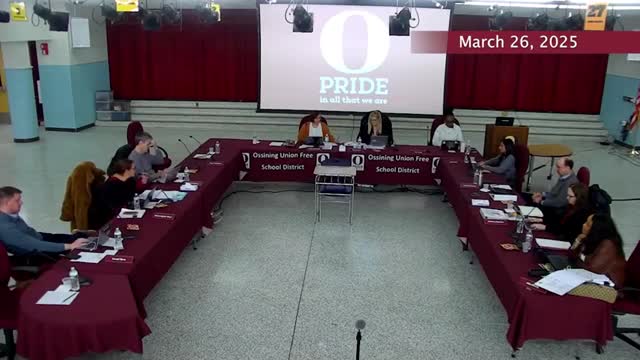Board continues budget discussion; staff detail software, summer programs, copier costs, BOCES options and lunch operations
Get AI-powered insights, summaries, and transcripts
Subscribe
Summary
During a work session, district administrators answered board questions about Frontline and Branching Minds, summer programming funding, copier/lease costs, BOCES pathways and the lunch program, and the board indicated support for a 1.67% tax levy target.
The Ossining Union Free School District held a work‑session discussion focused on the current budget and operational items, with Superintendent Mary Fox Alter and financial and program staff responding to board questions about software contracts, summer programs, copier costs, BOCES career and technical education (CTE) options, and cafeteria operations and funding.
Maria (district staff) explained that Frontline is used primarily for personnel and HR functions, and that Branching Minds is the district’s MTSS (multi‑tiered systems of support) platform used to gather student data and manage tiered interventions. Maria told the board that Frontline includes a module (IEP Direct) used to produce IEPs and 504 plans and that the district is transitioning analytics from Tableau to Forecast5 under the Frontline parent company.
On summer programming, administrators said the district has historically used grants to fund summer school; with some grants sunsetting this year, the district shifted funding for summer school into the general fund. The district described three summer offerings: the Summer Learning Academy (incoming kindergarten through incoming fifth graders), A&D programming (incoming sixth through incoming eighth graders), and an additional level expanded as needed to serve students who require less intensive support. Staff said students are selected based on assessment data and that June NWEA, IRLA and other data are used to set baselines and monitor summer program outcomes.
Business official Alita explained the district’s copier contract and costs: a vendor relationship with Connecticut Business Systems (CBS) handles district‑wide leased machines, maintenance and supplies. Alita said district spending on copier services was about $67,000 in 2022–23, $72,000 in 2023–24, and $49,000 to date in 2024–25; the annualized figure was described in discussion as roughly $60,000–$67,000. The board asked whether machines and contract terms could be adjusted to reduce costs; staff said machines are leased under multi‑year contracts and the district would incur charges to alter service before the lease expires, so any reductions would need to wait until contract renewal.
Board members and administrators discussed career and technical education and Putnam Northern Westchester BOCES programs. Staff said BOCES CTE programs typically start in junior and senior year and cost about $12,000–$13,000 per student; space and equipment costs make in‑district replication of some programs expensive. The board asked about earlier exposure for younger students (career days, middle‑school trials) and staff agreed to follow up with BOCES representative Jeremy Dukos about middle‑school outreach and with the high school guidance department about pathways and partnerships with Westchester Community College.
On cafeteria operations, Alita and other staff clarified that school lunches are accounted for in the separate C (cafeteria) fund and do not affect the general fund or tax levy. Because the district participates in the federal Community Eligibility Provision (CEP), students currently receive meals without charge; staff advised that if CEP eligibility were lost or funding changed, only state waivers or C‑fund balances could temporarily cover the gap. The district said adding kiosks or other service changes would likely require additional staff or contract renegotiation with Whitsons, the food service vendor (Whitsons was the only bidder on the most recent food service contract). Staff described earlier exploration of an app and cloud‑based point‑of‑sale system (Mosaic) and cautioned that pre‑ordering apps may not reduce daily participation or line time because meal accountability and allergy alerts require students to pass through registers tied to the student information system.
Staff and board members also discussed data capacity. Administration said the district is moving to Forecast5 for analytics and has budgeted project fees to integrate local databases into that system. The district has been using consultants while recruiting for a civil‑service position titled data analyst; staff described civil‑service hiring constraints and said consultants currently bridge the gap.
On process, trustees said they want further analysis of possible efficiencies but acknowledged contractual and civil‑service constraints. Board members indicated a consensus (voice agreement) to proceed with the proposed 1.67% tax levy target at this stage of the budget process while continuing to examine potential line‑item adjustments and one‑time funding options.
No final policy changes were adopted at the meeting; staff were asked to follow up on BOCES middle‑school outreach, cafeteria pilot options and copier contract timing and to provide clarifications on the C‑fund balance and CEP contingency planning.
